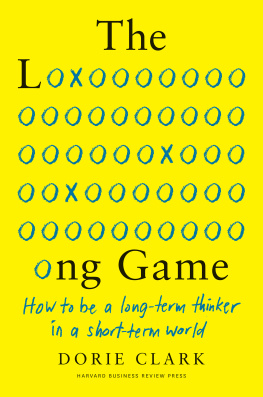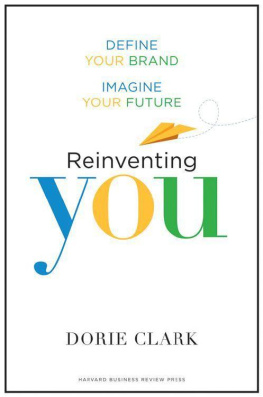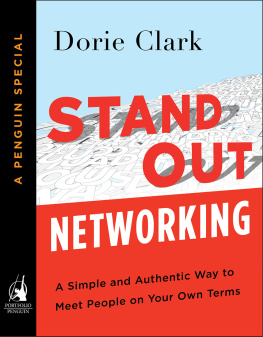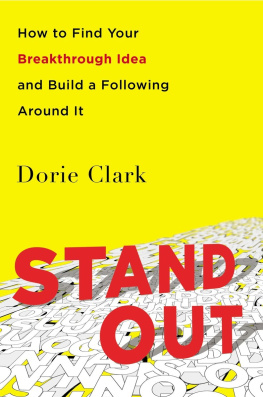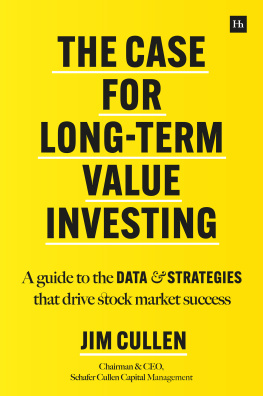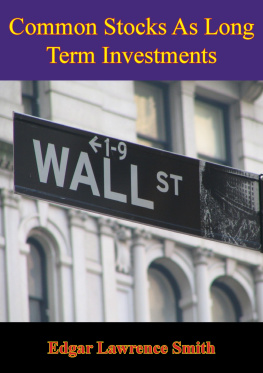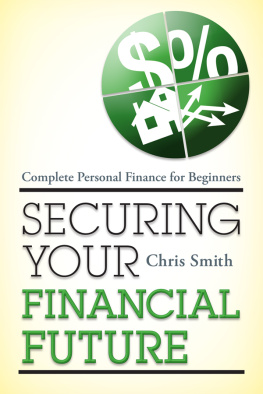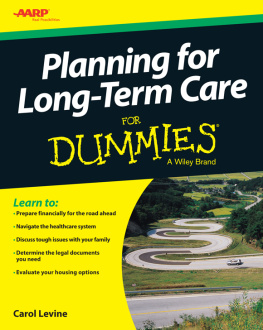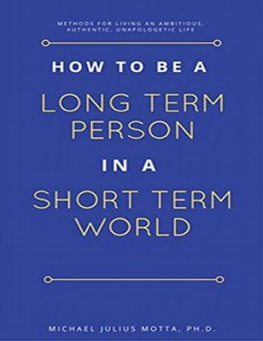First and foremost, I could not have written this book without the friendship, encouragement, and inspiration provided by members of my Recognized Expert community. Im especially grateful to the members who shared their insights and allowed me to tell their stories in this book.
A deep thank you to everyone I featured in The Long Game : your wisdom and your story will help countless others.
Thank you to my longtime agent, Carol Franco, and my incisive editors, Jeff Kehoe and Alicyn Zall, for making this book possible. Id like to express my gratitude to Stephani Finks for her patience and hard work in the cover design process; Julie Devoll and Felicia Sinusas for promoting the book and creating an exceptional launch; and Victoria Desmond, Josh Olejarz, and other members of the Harvard Business Review team for their efforts in enabling The Long Game to come to fruition.
My talented assistant, Jon Hugo Ungar, provided invaluable help in enabling me to focus on the book while knowing that the rest of my business was in good hands.
As always, Im grateful to my mother, Gail Clark, and to Ann Thomas for their love and support, and to close friends who always provide wise counsel, including Alisa Cohn, Jenny Blake, Shama Hyder, Petra Kolber, Joel Gagne, and so many others I hold in my heart, including the late Patty Adelsberger.
I would be remiss in not mentioning my amazing cats Phillip and Heath. Phil spent Covid Zoombombing enough hours to earn his Actors Equity card and is currently seeking representation for stage, film, television, and endorsement opportunities.
Visit https://petfinder.com to find a beautiful homeless pet you can adopt.
About the Author
DORIE CLARK helps individuals and companies get their best ideas heard in a crowded, noisy world. She has been named one of the Top 50 management thinkers in the world by Thinkers50. She was honored as the #1 Communication Coach in the world by the Marshall Goldsmith Leading Global Coaches Awards, and one of the Top 10 Communication Professionals in the World by Global Gurus.
Clark teaches executive education at Duke Universitys Fuqua School of Business and at Columbia Business School. In addition, she speaks and consults for clients such as Google, the Bill & Melinda Gates Foundation, and the World Bank. A former presidential campaign spokesperson, Clark is the author of Entrepreneurial You , Reinventing You , and Stand Out , which was named the #1 Leadership Book of the Year by Inc. magazine.
Clark has been described by the New York Times as an expert at self-reinvention and helping others make changes in their lives. She is a frequent contributor to Harvard Business Review , a producer of a multiple Grammy-winning jazz album, and a graduate of Harvard Divinity School.
You can download your free Long Game Strategy Self-Assessment at dorieclark.com/thelonggame.
1
The Real Reason Were All So Busy
We all know that rushing around and living eternally in the short term isnt optimal. In fact, in a study of senior leaders by the Management Research Group, 97% identified strategic thinkingthe ability to focus deliberately on long-term prioritiesas key to their organizations success.
But somethings getting in the way. In a separate study, almost the exact same percentage of respondents96%claimed they dont have enough time to do long-term strategic thinking.
Really?
Theres no question that professionals today are busy. A McKinsey study shows knowledge workers spend a full 28% of their time processing email, down to about two or three meetings per workday. Thats not unusual; thats just Tuesday.
The frenzy of scurrying from appointment to appointment, writing report after report, taking an occasional selfie (hi, internet!), and then answering emails until midnight begins to feel like were living our own personal Groundhog Day . Meanwhile, our real workthe work we get evaluated on, and that actually accomplishes somethingis what gets sandwiched in between.
The truth is, some firms still erroneously conflate face time at the office (or screen time if youre working virtually) with productivity and company loyalty. Research shows that employees who log fifty or more hours per week earn 6% more compared with their less-zealous colleagues, So the always on mentality is a rational adaptation to those misplaced incentives.
But thats not the whole story. When 96% of high-achieving leaders say they just cant get around to something mission-critical, something else is going on.
The Hidden Benefits of Frenzy
We say we want white space in our calendar and time to think. After all, we constantly feel on the brink of falling behind. Were always looking ahead to the next thing on the calendar and are never able to enjoy whats in front of us. Even the best job becomes miserable if the pace is too frenetic, the demands too overwhelming, and the pressure too unyielding.
So why cant we stop?
It turns out that we may be deriving hidden benefits from our relentless, short-term execution mode. Research from Silvia
In other words, being crazy busyand making sure others know itmay, consciously or subconsciously, be important to our self-esteem. And though we long for the time to do long-term thinking, possessing it may signal were just a little less essential than we thought we were.
Self-worth is certainly a powerful incentive for us to keep busy. But its not the only one.
Numbing Out
Busyness is also, it turns out, an anesthetic. The author Tim Ferriss, in an interview on his podcast, The Tim Ferriss Show , talked about how up until at least 2004, my solution to feeling anything I didnt want to feel was to add more activities to drown it out. Some people use heroin, some people use coke, some people use work. And I used activities.
Ive certainly done the same. Several years ago, reeling from a breakup and a death in my family, I sold my house, moved to another state, and still managed to deliver sixty-one keynote talks that year. More than once a week, I clambered into yet another taxi, boarded yet another plane, and traveled to yet another hotel ballroom. And I loved it, because being away from my home was the only time I wouldnt cry. I could focus on the mechanics: which airline, which terminal, which gate. I could focus on delivering my talk and pleasing the client. Even the logisticswhere to find good Indian food in Cincinnati or Phoenix or Charlottehelped distract me. Because when I got back home and found myself alone, it was often more than I could bear.
Theres great existential comfort in feeling that you know what to do . When were busy and focused on execution, theres no time to ask questions that might have discomfiting answers. Is this the right path? What does success really mean? Am I living my life the way I want to? If you need to grow revenue by 25% but dont know how, or need to reevaluate your career choices, or have to cope with industry disruption, its much easier to keep doing the same thing and insist you just dont have time for a reappraisal of your business, or your life.
That was the case for Ali Davies, a self-employed consultant in Canada. Originally from England, Ali had a successful corporate career for fourteen years, but at about the ten-year mark, I was feeling unsettled and unhappy, she told me. I knew I wanted out, but kept convincing myself to stay. I was successful, and [there was] fear of what that would mean for my identity if I turned my back on the conventional definition of success, and fear of it being the wrong decision.

